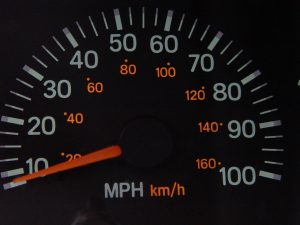“I feel the need, the need for speed” is one of the most quotable lines from the original Top Gun movie. But when you consider the statistics and facts about speeding, speed is not needed on Tennessee roadways. In fact, The National Highway Traffic Safety Administration has launched a new safety campaign about speeding because 11,258 people were killed in 2020 (the most recent complete and analyzed data year) because of speeding, which was a 17% increase over the prior year. In addition to the statistics, let’s look at whether speeding really saves time, when speeding rises to the level of reckless driving and other downsides of speeding including the points on your license.
- Can you get a ticket for speeding if your speed was less than the posted speed limit?
Our daughter recently attended driving school to prepare for her learner’s permit exam. In driving school, she was correctly taught that the posted speed limit is the maximum limit. Road and weather conditions can require drivers to go slower than the posted speed limit and a failure to do so can result in a citation for speeding (even if you were below the posted speed limit). Traveling the speed limit of fifty-five miles per hour may be a safe speed on a typical day but going that speeding in rain or ice may be reckless. If you are issued a citation for driving too fast for conditions, 3 points will be assessed to your license.
- How does speeding affect insurance?
Insurance companies insure risk. That is their business. The riskier something is to insure then the higher the premium. Insurance companies view moving violations such as speeding tickets as evidence of your abilities and propensities as a driver. Statistically, a driver who is speeding is more likely to be involved in an accident. Again, more risk equals higher premium. So, yes, your insurance premium will almost certainly increase. A speeding ticket also will result in points being added to your license. The number of points depends upon how much you were exceeding the speed limit. 1 to 5 mph will result in 1 point while 46 mph over the speed limit will result in 8 points being added to your license.
- What is reckless driving in Tennessee?
There is not a set criterion for reckless driving in Tennessee. In other words, 20 mph over the speed limit is not an automatic reckless driving charge. Instead, Tennessee Code Annotated 55-10-205 defines reckless driving as “any person who drives any vehicle in willful or wanton disregard for the safety of persons or property commits reckless driving.” As a result, law enforcement have a lot of discretion on when to issue citations for reckless driving. If you are found guilty of reckless driving, that charge alone will add 6 points to your license. Of course, you are also going to receive points speeding. Twelve points or more in a 12-month period will trigger a suspension hearing, and your license could be suspended for 6-12 months.
- Does speeding really save time?
Not as much as you might think. According to a study by the U.S. Army, if your trip distance is 15 miles and the speed limit is 35 miles per hour, you will only save 5.71 minutes if you travel 10 mph over the speed limit for the entire 15 mile distance. Time savings is even further diminished at higher speeds. For that same 15 minute trip, if the speed limit is 65 mph and you travel at 75 mph, your time savings is only 1.85 minutes. Although your time savings is minimal, your risk of an accident or a speeding ticket is high. And as outlined above, law enforcement officers have a lot of discretion for giving reckless driving citations. If you are 10 or 15 miles per hour over the speed limit in a residential area or school zone, a reckless driving charge is not out of the question.
Bottom line: slow down. It could save your life. It could save someone’s else’s life. Slowing down is also better for the environment as speeding results in more CO2 emissions because fuel consumption is increased (and the money in your wallet is decreased because you are paying more in fuel). You will not save as much time as you might think by speeding and you avoid the risk of a ticket, points on your license and higher insurance premiums.
 Tennessee Injury Law Center
Tennessee Injury Law Center


